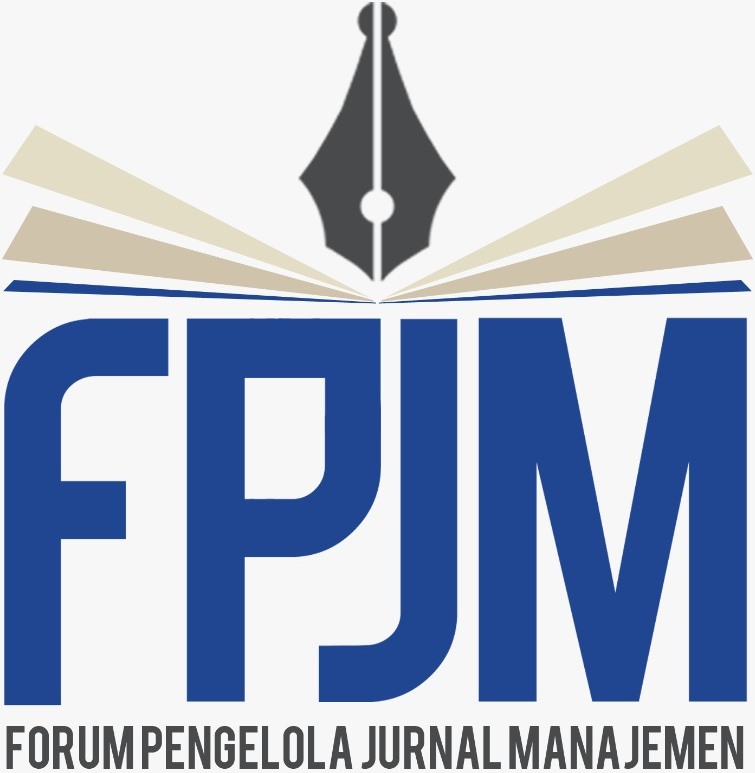THE ROLE OF LEADERSHIP IN INNOVATION PERFORMANCE: TRANSACTIONAL VERSUS TRANSFORMATIONAL STYLE
Abstract
Abstract: The purpose of this study was to examine the effect of transactional and transformational on the innovation performance of lecturers. The population of this research is all lecturers at a private university in Tangerang totaling 180 people. The research sample used a random sampling method. The data used are primary data collected through a questionnaire. The number of returned and valid questionnaires was 120 samples. The data is processed using Structural Equating Model (SEM). The results of the study conclude that transactional and transformational leadership have a positive impact on the innovation performance of lecturers. This study proposes a model to improve the performance of lecturers in Tangerang through improving leadership practices in universities. This study can pave the way to improve the readiness of lecturers in facing the 4.0 education era.
Abstrak: Tujuan penelitian ini adalah untuk menguji pengaruh transaksional dan transformasional terhadap kinerja inovasi dosen. Populasi penelitian ini adalah seluruh dosen pada salah satu universitas swasta di Tangerang berjumlah 180 orang. Sampel penelitian menggunakan random sampling method. Data yang digunakan adalah data primer yang dikumpulkan melalui kuesioner. Jumlah kuesioner yang kembali dan valid sebanyak 120 sampel. Data diolah dengan menggunakan Structural Equating Model (SEM). Hasil penelitian menyimpulkan bahwa kepemimpinan transaksional dan transformasional berpengaruh positif terhadap kinerja inovasi dosen. Penelitian ini mengusulkan model untuk meningkatkan kinerja dosen di Tangerang melalui peningkatan praktik kepemimpinan di perguruan tinggi. Kajian ini dapat membuka jalan untuk meningkatkan kesiapan dosen dalam menghadapi era pendidikan 4.0.
Keywords
References
Al-Husseini, S., El Beltagi, I., & Moizer, J. (2019). Transformational leadership and innovation: the mediating role of knowledge sharing amongst higher education faculty. International Journal of Leadership in Education, 00(00), 124. https://doi.org/10.1080/13603124.2019.1588381
Al-Mansoori, R. S., & Koç, M. (2019). Transformational leadership, systems, and intrinsic motivation impacts on innovation in higher education institutes: Faculty perspectives in engineering colleges. Sustainability (Switzerland), 11(15). https://doi.org/10.3390/su11154072
Anning-Dorson, T. (2016). Interactivity innovations, competitive intensity, customer demand and performance. International Journal of Quality and Service Sciences, 8(4), 536554. https://doi.org/10.1108/IJQSS-11-2015-0075
Asbari, M. (2020). Is Transformational Leadership Suitable for Future Organizational Needs? International Journal of Sociology, Policy and Law (IJOSPL), 01(01), 5155.
Asbari, M., & Novitasari, D. (2020). The Role of Readiness for Change on Part-Timer Employee Performance: Analysis of Transformational Leadership Practice in Convection Industry. Journal of Communication Education (JOCE), 14(2).
Asbari, M., Prasetya, A. B., Santoso, P. B., & Purwanto, A. (2021). From Creativity to Innovation: The Role of Female Employees Psychological Capital. International Journal of Social and Management Studies (IJOSMAS), 02(02), 6677.
Asbari, M., Santoso, P. B., & Prasetya, A. B. (2020). Elitical and Antidemocratic Transformational Leadership Critics: Is It Still Relevant? (A Literature Study). International Journal of Sociology, Policy and Law (Ijospl), 01(01), 1116. https://doi.org/10.8888/ijospl.v1i1.10
Bass, B., & Avolio, B. (2000). Technical Report,Leader form, rater form, and Scoring Key of MLQ From 5x-Short. Mind Garden, Inc.
Bass, B. M. (1985). Leadership: Good, Better, Best. Organizational Dynamics, 13(3), 2640.
Bogler, R. (2001). The Influence of Leadership Style on Teacher Job Satisfaction. Educational Administration Quarterly, 37(5), 662683. https://doi.org/10.1177/00131610121969460
Elrehail, H. (2018). The Relationship Among Leadership, Innovation and Knowledge Sharing: A Guidance for Analysis. Data in Brief, 19, 128133. https://doi.org/10.1016/j.dib.2018.04.138
Ghozali, I. (2014). Structural Equation Modeling, Metode Alternatif dengan Partial Least Square (PLS) (4th ed.). Badan Penerbit Universitas Diponegoro.
Gumusluoglu, L., & Ilsev, A. (2009). Transformational leadership, creativity, and organizational innovation. Journal of Business Research, 62(4), 461473.
Hazriyanto, & Ibrahim, B. (2019). The factor analysis of organizational commitment, job satisfaction and performance among lecturers in Batam. Journal of Technical Education and Training, 11(1), 151158. https://doi.org/10.30880/jtet.2019.11.01.19
Jordan, G., VukoviÄ, G., & MariÄ, M. (2017). Effect of Meaning of Work on Job Satisfaction: Case of Lecturers in Higher Education In Six CEE Countries. The Twelfth International Conference: Innovative Responses for Growth and Competitiveness.
Kearney, J. (2017). An Investigation into the Associative Relationship Between Transformational Leadership and Innovative Working Behaviour, in Irish Technology Consulting Organisations. National College of Ireland. http://norma.ncirl.ie/2869/1/jeremykearney.pdf
Leithwood, K., & Jantzi, D. (2009). Transformational Leadership. The Essentials of School Leadership, 28, 3752. https://doi.org/10.4135/9781446288290.n3
Mahmood, S., Muhammad, R., & Farooq, A. (2020). Investigating the impact of Transformational Leadership on Employee Innovative Behavior and Job Performance : The mediating role of Public Service Motivation Abstract : 40(1), 455465.
Mansury, M. A., & Love, J. H. (2008). Innovation, productivity and growth in US business services: A firm-level analysis. Technovation, 28(12), 5262. https://doi.org/10.1016/j.technovation.2007.06.002
Masood, M., & Afsar, B. (2017). Transformational leadership and innovative work behavior among nursing staff. Nursing Inquiry, 24(4). https://doi.org/10.1111/nin.12188
Nasir, M. J. A., Wiyono, B. B., Supriyono, & Supriyanto, A. (2017). The Relationship between Motivation, Organisational Commitment and Competence with Job Satisfaction and Lecturers Performance. International Journal of Learning and Development, 7(3), 165. https://doi.org/10.5296/ijld.v7i3.11688
Ong, F., Purwanto, A., Supono, J., Hasna, S., Novitasari, D., & Asbari, M. (2020). Does Quality Management System ISO 9001:2015 Influence Company Performance? Answers from Indonesian Tourism Industries. Test Engineering and Management, 83, 2480824817.
Rajapathirana, R. P. J., & Hui, Y. (2018). Relationship between innovation capability, innovation type, and firm performance. Journal of Innovation and Knowledge, 3(1), 4455. https://doi.org/10.1016/j.jik.2017.06.002
Sasono, I., & Novitasari, D. (2020). Enhancing Service Quality through Innovation Capabilities and Work Productivity. International Journal of Science and Management Studies (IJSMS), 3(5), 123133. https://doi.org/10.51386/25815946/ijsms-v3i6p111
Ullah, M. I., Hamid, K. B. A., & Shahzad, A. (2016). Impact of Transformational Leadership on Knowledge Sharing of Employees and Innovation Capability in the Dairy Sector of Pakistan. Pakistan Journal of Social Sciences, 36(1), 8798.
Wang, Y., Song, J., Baker, J., & Kim, Y. (2018). The Role Of Service Standardization Capability In Service Innovation: Evidence From Knowledge-Intensive Service Firms. AIS eLibrary. https://aisel.aisnet.org/amcis2018/DigitalAgility/Presentations/6/
Wu, I. L., & Hu, Y. P. (2018). Open Innovation Based Knowledge Management Implementation: A Mediating Role of Knowledge Management Design. Journal of Knowledge Management, 22(8), 17361756. https://doi.org/10.1108/JKM-06-2016-0238
DOI: 10.34203/jimfe.v7i1.2981
Refbacks
- There are currently no refbacks.
Copyright (c) 2021 JIMFE (Jurnal Ilmiah Manajemen Fakultas Ekonomi)

This work is licensed under a Creative Commons Attribution-NonCommercial-ShareAlike 4.0 International License.











